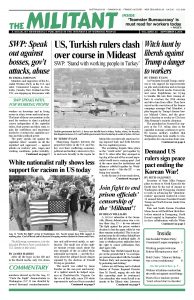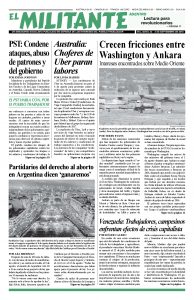September 6, 1993
“Most people look at prisoners as scum of the earth. But we’re almost all working-class people, human beings with an interest in fighting for human rights. We have common interests and the only way we’re going to protect our rights is by our actions and our unity.” This is how Mark Curtis began to explain what a socialist worker does behind bars.
Curtis, a union activist and member of the Socialist Workers Party in Des Moines, Iowa, was framed up by the police in 1988 on false charges of sexual assault and burglary. At the time, he was involved in protesting the arrest of 17 coworkers in an immigration raid at the meat-packing plant where he worked.
“I’ve met meat packers and truck drivers, some who’ve been involved in union fights,” he said. “There are many people who’ve been touched by the civil rights movement.”
September 6, 1968
FORT DIX, N.J. — The Army brass here has launched a new attack on antiwar views and constitutional rights within the armed forces. Specialist Fourth Class Allen Myers is now facing a court-martial at Fort Dix for the “crime” of giving antiwar leaflets to his fellow GIs during his off-duty hours. Myers’ personal books have been confiscated, and he has been restricted to his company area on the base.
The antiwar GI, who has been in the Army 16 months, was an activist in the antiwar movement in Madison, Wis., before being drafted. He is a member of both the Young Socialist Alliance and the Socialist Workers Party.
Myers is charged with violation of a local Fort Dix regulation outlawing the distribution of “handbills” which are in “bad taste,” “subversive,” or “detrimental to good discipline.”
September 4, 1943
Armed with new police powers against the unions by President Roosevelt’s sanctions order of August 16, the War Labor Board is applying the administration’s policy of keeping wages frozen despite runaway prices. Among the workers widespread dissatisfaction with WLB policies and the no-strike pledge is reflected in recent strike votes.
The National Labor Relations Board reported that in every one of 13 strike ballots taken under the Smith-Connally Act from 60 to 100% of the workers voted to strike.
Last week the WLB rejected the portal-to-portal pay provision in the agreement negotiated between the United Mine Workers and the Illinois Coal Operators Association. Calling it a “hidden wage increase,” the board snatched out of the miners’ hands this much needed additional pay.

